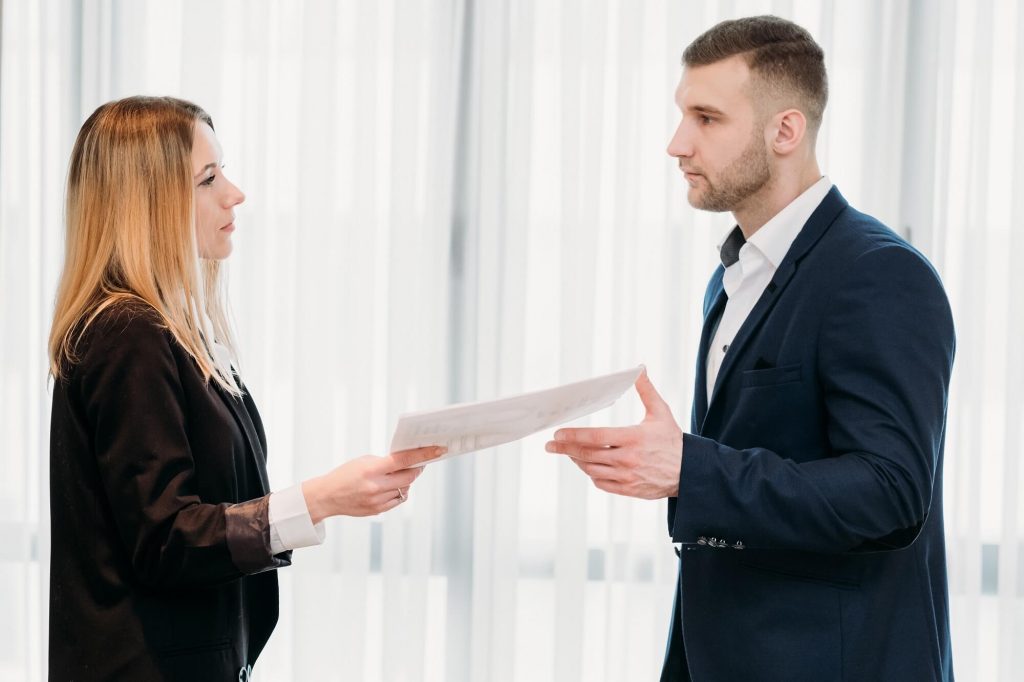On average, an uncontested divorce, where both parties agree on major issues, might take around a few months to be finalized. However, a contested divorce involving disputes over key matters can extend the process to a year or more. The exact duration depends on factors such as court availability, documentation, negotiation, and the need for hearings or trials.
Table of Contents
ToggleIf you need a better idea of how long your marriage dissolution may take, the information in this article will be useful for calculations.
Average Uncontested Divorce Length in MN
Getting a divorce in Minnesota is easier and faster if you apply for an uncontested marriage dissolution. Typically, the duration of an amicable divorce is a couple of months. Of course, there may be case specifics that affect the length, but a common process is the following:
1) Document Preparation (2-4 weeks)
First of all, a petitioner has to fill out divorce forms. Collecting the needed data and completing divorce documents may be difficult and time-consuming for people without legal backgrounds. So, a petitioner may want to delegate this task to experts. The most popular option nowadays is to find a reliable online divorce service and order the needed forms there. Such services work remarkably fast and charge less than attorneys for this type of assistance.
2) Serving a Respondent (1-2 weeks)

Once done, a petitioner has to serve copies of papers to a defendant with the help of a sheriff or a third party over 18 uninvolved in the case. If you know where your spouse is and they are likely to accept the documents, this step can only take a few days.
3) Response and Agreement (2-4 weeks)
A defendant must prepare a response within 30 days. Besides, divorcing spouses need to create a written agreement to define all their decisions concerning property and debt division, child custody and support, alimony, and other relevant divorce matters. On average, it takes about a month to handle such tasks.
4) Petition Filing (1-2 weeks)
A divorce case starts officially when a petitioner submits a Petition for Dissolution of Marriage to the local court. Usually, this stage of the divorce process takes little time, varying from several days to a few weeks. The primary factor affecting the timeframe is the court’s schedule, but usually, spouses don’t have to wait long.
5) Parenting Plan (1-2 months)
When partners have minor children, they must prepare a parenting plan and attend parent education classes, even if they have no disputes about child custody and support. This step is necessary to ensure that parents understand how to take care of kids properly when living apart.
6) Financial Settlement (1-3 months)
The time it takes to reach a financial settlement depends on the complexity of your financial situation. Both spouses must provide financial information, such as income, assets, debts, and expenses, to make a fair decision. The speed at which this information is gathered can influence the timeline. If both spouses are cooperative and organized, this stage can be completed more quickly.
7) Court Submission (2-4 weeks)
When all issues related to parenting responsibilities and finances are settled, spouses need to submit additional documents pertinent to their decisions to the court so that the judge can review them before signing the Final Divorce Decree. This stage of the divorce process may take several weeks and mainly hinges upon the judge’s schedule.
8) Final Decree (1-2 months)
In general, an overall uncontested divorce process in MN lasts several months. Since spouses agree on all major divorce topics, they don’t have to participate in court trials. The judge will study their agreement and approve it as long as it is fair and comprehensive. The issued Final Divorce Decree legally ends the marriage.
How Long Does a Contested Divorce Take in Minnesota?

A contested divorce timeframe is often much longer and can exceed a year. Since spouses can’t reach a compromise on one or several divorce matters, they have to put up with a time-consuming and emotionally taxing litigation. In general, the process is the following:
1) Document Preparation (2-4 weeks)
Some stages of a contested divorce process resemble those of an uncontested marriage dissolution. For example, a petitioner also needs to gather personal data and use it for completing divorce forms.

2) Serving a Respondent (1-2 weeks)
Serving the documents to the other party in a contested case may take longer than in an uncontested one if they try to avoid accepting the papers or if their current location is unknown.
3) Response (2-4 weeks)
An allocated time for a defendant to fill out and submit a response is also 30 days. Of course, it is better to prepare the answer as fast as possible to move forward in the divorce process.
4) Petition Filing (1-2 weeks)
A petitioner has to submit a Petition for Dissolution of Marriage to the court, thus requesting to end their marriage officially.
5) Discovery (2-6 months)
Discovery is the process of gathering information and evidence relevant to a divorce case. It can include exchanging financial records, documents, and responses to interrogatories, among other things. The timelines of the discovery phase depend on the case’s complexity and the degree of cooperation between the parties involved, but it usually takes 2+ months.
6) Mediation (2-4 months)
Mediation is a confidential method to resolve problems with the help of a neutral third party. The mediator’s job is to guide discussions between the parties to find mutually satisfying solutions. A common mediation process in a contested divorce consists of 3 to 4 two-hour mediation sessions spanning a period of 6-8 weeks.
7) Pretrial Hearing (1-3 months)
One or both spouses can submit pretrial motions, which are legal requests to the court before the trial to address specific divorce-related issues or seek court orders. Such requests will be reviewed at a pretrial hearing. If there are many disputed issues or complex financial and custody matters, it may take longer to prepare papers. Besides, the number of motions impacts the duration of a contested divorce.
8) Trial (1-5 days)

A divorce trial is the formal legal process where spouses or their lawyers present the case before a judge, who decides on unresolved issues. The trial typically lasts several days.
9) Judgment and Decree (1-2 months)
After that, the judge needs time to study all the papers, understand the case, and make an informed, well-grounded decision. Once done, the couple will receive the Final Divorce Decree, which outlines their rights and responsibilities related to marriage dissolution.
10) Appeals (varies)
If either party is dissatisfied with the court’s decisions, they may file an appeal to have it reviewed by a higher court. While the average divorce length in contested cases is about a year, applying for appeals can significantly extend the process.
How Long Does It Take to Finalize a Divorce?
Estimating a precise timeframe for a divorce is quite challenging. The average process duration may range from 6 months to a year or longer, depending on the circumstances. However, if you wonder, “When does a divorce become final?”, the answer is clear – when the judge issues a signed Divorce Decree.
Factors Affecting the Length of a Minnesota Divorce
Some divorce cases are finalized within several months, while others take much more time. Check out the factors that have a major influence on the divorce duration:
Type of Divorce Process
Why does a divorce take so long? It mostly happens because spouses act aggressively when it comes to dispute resolution, thus applying for a contested divorce. Such cases take a year or longer to resolve. In contrast, uncontested divorces, when spouses are in agreement on key issues, tend to proceed more swiftly and can often be finalized in a matter of months.
Complexity of Assets and Debts

Divorces with intricate financial arrangements, such as multiple expensive properties, investments, or business assets, often require more time to evaluate and divide them.
Child Custody and Support
Negotiations over child support and custody can prolong the process as they require thorough consideration and may involve court intervention, leading to a longer divorce timeline.
Spousal Support (Alimony)
If spouses can’t agree on the necessity of alimony, its amount, and duration, they have to wait until the court makes a fair decision and finalizes their divorce.
Jurisdiction
Variations in local court procedures, caseloads, and specific divorce laws can either expedite or slow down a divorce process. Today, couples seeking a quick divorce in MN online opt to eFile their papers. However, this option will work best for uncontested cases.


Teresa Miller is a true luminary in the realm of family law. The expertise of this celebrated author and legal scholar extends to her insightful writings, which have become an indispensable resource for both legal practitioners and families in need. Her passion for the field of family law is as enduring as her commitment to justice. Miller’s profound knowledge and dedication have made her a respected authority, and her writings are a must-have in numerous professional and personal libraries.



